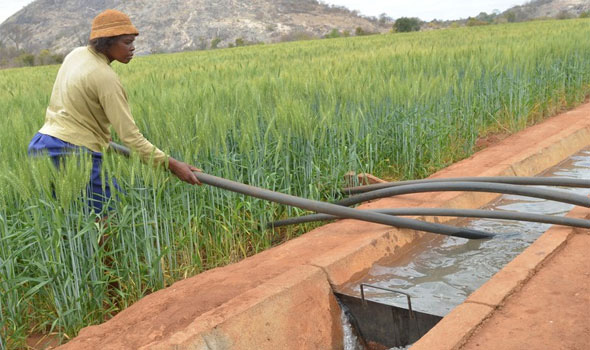Irrigation schemes to speed up rural growth
Government, under the Accelerated Irrigation Rehabilitation and Development programme, has started resuscitating communal irrigation schemes nationwide, a key enabler to improved yields and livestock production for smallholder farmers.
Back-to-back droughts and poor harvests recorded in past cropping seasons are confirming the importance of moving away from reliance on rain-fed agriculture.
Most farmers do not irrigate crops citing poor or lack of irrigation systems, resulting in the wilting of crops and poor yields.
As the Government steps up efforts to resuscitate viable smallholder irrigation infrastructure, it is an important acknowledgement that irrigation is sustaining and guaranteeing the country food security in the face of drought.
Smallholder farmers can also attain maximum yields through irrigation. The programme aims at reviving at least 200ha in every district every year until 2030.
Pursuant to this programme, the Department of Irrigation Development is working on several communal irrigation schemes nationwide under the turn-key approach, a move which is meant to ensure holistic completion of targeted projects so that the idea of climate proofing agriculture, especially in the communal areas, becomes a reality.
The initiative is being coordinated by the Irrigation Department under the Ministry of Lands, Agriculture, Fisheries, Water and Rural Resettlement, with funding from the Ministry of Finance and Economic Development’s Public Sector Investment Programme (PSIP).
This year alone, the initiative is set to resuscitate about 21 communal irrigation schemes covering at least 1 700ha, which are being implemented in partnership with Maka Resources, an irrigation company with interests in the manufacture of centre pivot irrigation systems.
Out of the 21 targeted irrigation schemes, 11 schemes have already been completed and production has already started with preparations for commissioning underway.
Irrigation development has been identified as a key accelerator towards uplifting the livelihoods of rural communities besides providing a boost to agricultural production and productivity.
This resonates well with President Mnangagwa’s Vision 2030 as articulated under the National Development Strategy 1, which seeks to put 350 000 hectares under irrigation countrywide using idle water bodies and dams under construction.
This drive is meant to propel the country towards food self-sufficiency through guaranteed year round crop production.
With the turn-key irrigation project, smallholder farmers are now growing high value crops, both for local and export markets, thus effectively participating in the mainstream economy.
Speaking during the tour of Dzvete Communal Irrigation Scheme in Mashonaland East recently, Mr Bernard Mupuriri, the director of the Implementation and Monitoring Department, in the Ministry of Finance and Economic Development said the project sought to ensure that communal farmers become food self-sufficient.
Dzvete irrigation scheme is one of other several small-scale community irrigation projects that have been rehabilitated countrywide. Mr Mupuriri said the Government is capacitating smallholder communal farmers through implementation of irrigation schemes so that they will as well contribute to the national GDP.
After the Government has done its part of resuscitating irrigation schemes, farmers should be responsible by maintaining the water infrastructure and employ good agricultural practices.
Mr Mupuriri said modernisation in agriculture did not just entail sophistication of the infrastructure being used, but the simplicity and clarity of the management tools.
“Irrigation also plays a part in the establishment of vital infrastructure such as roads, schools, clinics and telephones, while the farmers have since adopted a commercial mentality,” he said.
“With irrigation, smallholder farmers now grow high value crops, both for local and export markets, thus effectively participating in the mainstream economy.”
Mr Mupuriri said he was satisfied with the job being done by Maka Irrigation, the local contractor which was contracted by the Government to rehabilitate the irrigation schemes.
The company hit the ground running and within a short space of time, the company has managed to revive more than half of the schemes. Deputy director responsible for operation and maintenance in the Department of Irrigation Engineer Bezel Chitsungo said more was on the cards with regards to irrigation development.
“A lot of programming is underway to engage all payers in the irrigation sector and come up with win-win facilities that help accelerate irrigation development across all sectors, most importantly the recent promulgation of the Statutory Instrument on Control of Irrigable Areas Regulations (SI 38 of 2021) and the extension of the ZINWA mandate to cover infield irrigation development,” he said.
“These reforms and programmes that the Government is implementing in irrigation development are expected to benefit all stakeholders, especially the local communities.”
Eng Chitsungo said empowering communities with innovative technologies such as irrigation schemes will assist the nation in achieving Vision 2030.
Communal farmers are the main food producers and by empowering them, the country will be assured of household and national food security, and this will stop all the grain imports saving the country the much needed foreign currency, said Eng Chitsungo.
Even in drier periods, communal areas will no longer rely on food handouts from donors. Through irrigation, many communal farmers will engage in horticulture, while others may also venture into fisheries and enhanced livestock production projects.
Mr Patrick Mabubu, one of the beneficiaries, said the resuscitation of the irrigation schemes would go a long way in ensuring that communities do not depend on non-governmental organisations.
“We now want to produce our own food and stop relying on donations,” he said. “If people are to get donations, it has to be in the form of infrastructure since it is a long term benefit.
“We want to thank the Government for this initiative because we are now able to produce our own food even in the dry season. We want to thank our President Cde ED Mnangagwa, he is a visionary leader who has done many things for his people in a short space of time.”-herald.cl.zw










